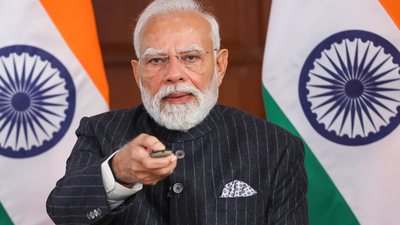HYDERABAD/NEW DELHI: PM Narendra Modi on Thursday virtually inaugurated Hyderabad-based spacetech startup Skyroot Aerospace’s Infinity campus and unveiled India’s first commercial orbital rocket, Vikram-I, which will launch satellites into low Earth orbit (LEO).Emphasising that India is on track to emerge as a global leader in the satellite launch ecosystem, Modi said, “The private sector is making giant strides in India’s space sector. Skyroot’s Infinity campus is a reflection of new thinking, innovation and most importantly, youth power. Our youth’s innovation, risk-taking ability and entrepreneurship are touching new heights.”Extending his best wishes to Skyroot CEO Pawan Kumar Chandana and company co-founder Naga Bharath Daka, the PM said the two entrepreneurs are an inspiration for young people. “Growth of the private space sector, spearheaded by companies like Skyroot, is also a testament to the govt’s efforts to foster innovation and private enterprise in the space domain,” he said.The Infinity facility, spread over 2 lakh sq ft in Hyderabad, will have the capability to design, develop, integrate and test multiple launch vehicles, with a capacity to build one orbital rocket every month. It adds to Skyroot’s 55,000-sq-ft integrated rocket design and development facility — Max-Q — near Hyderabad airport. Pointing out that though India’s space journey began with limited resources, its ambitions were never limited, Modi said: “India has proven that the height of dreams is determined not by resources but by resolve. Today, India possesses space sector capabilities that only a few countries in the world have.”He also praised Isro, saying it “has for decades given new wings to India’s space journey.” Modi also recalled the reforms undertaken in the space sector, with his govt opening up the sector to private innovation and preparing a new Space Policy.Modi highlighted that more than 300 space startups are today powering India’s space aspirations, with most of them starting out with small teams. “Gen-Z engineers, designers, coders and scientists are creating new technologies, whether in propulsion systems, composite materials, rocket stages or satellite platforms.”Space promoter and regulator IN-SPACe chairman Dr Pawan Goenka said that in just five years since the space sector was opened up, over 350 space startups have emerged. “The Infinity campus and Vikram-1 are testaments to what can be achieved when entrepreneurial ambition meets enabling policy. We are building more than rockets. We are building a competitive space economy,” he said.Skyroot co-founder Pawan Chandana said the company was ready to launch Vikram-1, fully designed and built in India, in the next two months. Pointing out that decisive space reforms had unlocked the skies for startups to fly, co-founder Naga Bharath Daka said Skyroot has already generated over 1,000 hi-tech jobs and will be investing around Rs 1,000 crore soon to become one of the few companies worldwide to achieve rapid and on-demand launch capabilities.Set up in 2018 by the two IIT alumni and former Isro scientists, Skyroot became the first Indian company to successfully build and launch a rocket into space with suborbital rocket Vikram-S.

Modi unveils Skyroot's Infinity campus, India's 1st pvt commercial rocket; says India set to be global leader in sat launch ecosystem


